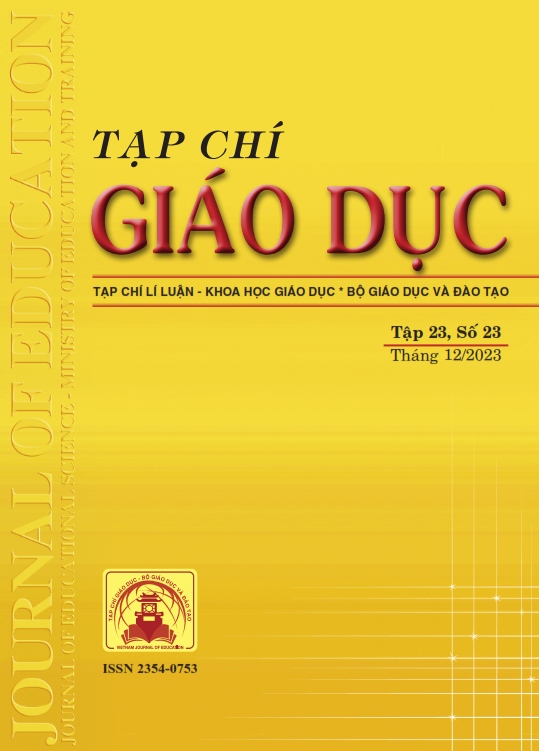Nhận thức của giáo viên về tổ chức hoạt động giáo dục STEAM dựa trên vui chơi cho trẻ mẫu giáo: một khảo sát định lượng
Tóm tắt
Play-based teaching is a popular approach in preschool programs around the world. Most children's daily play activities, along with toys, materials, and technology products, are related to STEAM fields. While many researchers around the world have been increasingly interested in the trend of play-based STEAM education for preschool children, this issue has not yet received due attention in Vietnam. This study surveyed 753 preschool teachers in several provinces/cities in the country about their views on organizing play-based STEAM educational activities. The survey results show that: teachers are aware of the feasibility and appropriateness of implementing play-based STEAM education. At the same time, they consider the lack of facilities, the large number of children in the class, and the lack of knowledge about the process of organizing play-based STEAM educational activities are the biggest barriers to the implementation of STEAM-based play in kindergartens. The research results can serve as a practical basis for proposing measures to promote the organization of play-based STEAM educational activities in preschools today.
Tài liệu tham khảo
Berlyne, D. E. (1960). Conflict, arousal and curiosity. McGraw-Hill.
Bộ GD-ĐT (2020). Thông tư số 51/2020/TT-BGDĐT ngày 31/12/2020 sửa đổi, bổ sung một số nội dung của Chương trình Giáo dục mầm non ban hành kèm theo Thông tư số 17/2009/TT-BGDĐT ngày 25/7/2009 của Bộ trưởng Bộ GD-ĐT, đã được sửa đổi, bổ sung bởi Thông tư số 28/2016/TT-BGDĐT ngày 30/12/2016 của Bộ trưởng Bộ GD-ĐT.
Bui, T. L., Tran, T. T., Nguyen, T. H., Nguyen-Thi, L., Tran, V. N., Dang, U. P., ... & Hoang, A. D. (2023). Dataset of Vietnamese preschool teachers' readiness towards implementing STEAM activities and projects. Data in Brief, 46, 108821.
Flanagan, K. (2011). PEI early learning framework-relationships, environments, experiences: The curriculum framework of the preschool excellence initiative. PEI Department of Education and Early Childhood Development.
Fleer, M. (2019). Scientific playworlds: A model of teaching science in play-based settings. Research in Science Education, 49(5), 1257-1278.
Gopnik, A. (2012). The philosophical baby: What children’s minds tell us about truth, live and the meaning of life. Random House.
Hewes, J. (2006). Let the children play: Nature’s answer to early learning. Canadian Council on Learning/Lessons in Learning (pp. 1-8).
Hoàng Thị Phương (2020). Đặc trưng của giáo dục STEAM cho trẻ mầm non - Khả năng tích hợp vào Chương trình Giáo dục mầm non. Tạp chí Khoa học, Trường Đại học Sư phạm Hà Nội, 65(11A), 108-116.
Hughes, B. (1996). A playworker’s taxonomy of play types. Playlink.
Hutt, C., Tyler, S., Hutt, C., & Christopherson, H. (1989). Play, exploration and learning. Routledge.
Jack, B. M., & Lin, H. S. (2014). Igniting and sustaining interest among students who have grown cold toward science. Science Education, 98(5), 792-814. https://doi.org/10.1002/sce.21119
Leuchter, M. (2013). Die Bedeutung des Spiels in Kindergarten und Schuleingangsphase. Zeitschrift Für Pädagogik, 59(4), 575-592.
Lillard, A. S., Lerner, M. D., Hopkins, E. J., Dore, R. A., Smith, E. D., & Palmquist, C. M. (2013). The impact of pretend play on children’s development: A review of the evidence. Psychological Bulletin, 139(1), 1-34. https://doi.org/110/1080/15200007093.36868
Moomaw, S. (2012). STEM begins in the early years. School Science & Mathematics, 112(2), 57-58. https://doi.org/10.1111/j.1949-8594.2011.00119.x
Nguyễn Mạnh Tuấn, Vũ Thị Kiều Trang (2022). Các yếu tố ảnh hưởng đến thực hành giáo dục STEM của giáo viên mầm non: Một nghiên cứu định lượng ở Việt Nam. Tạp chí Giáo dục, 22(17), 38-44.
Santer, J., Griffiths, S., & Goodall, D. (2007). Free play in early childhood. http://www.playengland.net/wpcontent/uploads/2015/09/free-play-in-early-childhood.pdf
Tunnicliffe, S. D. (2015). Starting inquiry-based science in the early years. Look, talk, think and do. Routledge.
Wilson, P. (2010). The playwork primer. Alliance for Childhood.
Tải xuống
Đã Xuất bản
Cách trích dẫn
Số
Chuyên mục
Giấy phép

Tác phẩm này được cấp phép theo Ghi nhận tác giả của Creative Commons Giấy phép quốc tế 4.0 .












